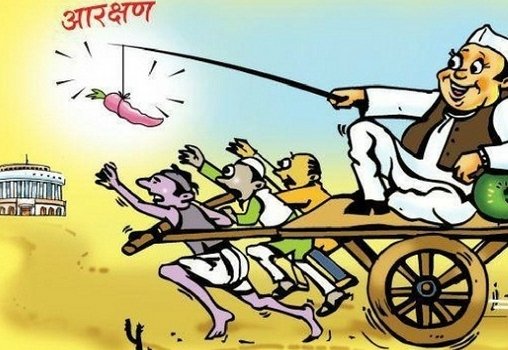A five-judge bench of the Hon’ble Supreme Court quashed the decision of the Andhra Pradesh government to provide 100 per cent reservation of teachers of the Scheduled Tribes on April 22. With the decision, the Court has reignited the debate on reservations in government jobs and higher educational institutions. The Court also restated its judgment in the famous Mandal Commission case wherein it had mandated a ceiling of 50 per cent on reservations.
Let us first understand the case. In January 2000, the Governor of Andhra Pradesh issued an order granting 100 per cent reservation members of the scheduled tribes in teaching positions in primary schools located in the tribal areas. The case came via an appeal from the High Court of Andhra Pradesh, which had deemed the order constitutional. While quashing the order, the Hon’ble Supreme Court noted that such 100 per cent reservation in particular jobs not only discriminates against the members of the general category but also the members of Scheduled Castes and Other Backward Classes. The Court stated;
“By providing 100 per cent reservation to the Scheduled Tribes has deprived the Scheduled Castes and the Other Backward Classes (OBCs) also of their due representation. It also impinges upon the right of open category and scheduled tribes who have settled in the Scheduled Areas after January 26, 1950. The rights of the Scheduled Tribes who are not residents of the scheduled areas shall also be adversely affected if the impugned order is allowed to become operational.”
The Court also stated that 100 per cent reservation is a clear violation of the right to equality before the law under Article 14, right against discrimination under Article 15, and the right to equal opportunity guaranteed under Article 16 of the Constitution. The judges determined that there was no reasonable explanation available to the state government to provide 100 per cent reservations for a particular office. The Court also levied a fine of Rs. 5 lakh on the Telangana and Andhra Pradesh governments.
While the judgment per se is not something new, the additional remarks made by the Hon’ble Court deserve due appreciation. The Court categorically stated that due to the lack of political will, governments refrain from doing anything on reservations. However, it is the responsibility of the state governments to change the list of scheduled castes, tribes and OBCs to keep up with the time. The bench also expressed regret over the current state of affairs by observing – “It is apparent that despite more than 72 years of attaining independence, we are not able to provide benefits to the bottom line, i.e., downtrodden and oppressed classes. Benefits meant to such classes are not reaching them.”
Further, the Court opined that;
“It was envisaged that social disparities, economic and backwardness should be wiped out within a period of 10 years, but gradually, amendments have been made, and there is no review of the lists nor the provisions of the reservation have come to an end. Instead, there is a demand to increase them and to provide reservations within the reservation. It is very hard for any elected government to have the political will to meet with the challenges arising out of the aforesaid scenario. By grant of privileges and amenities, it was felt that the aspirations of socially and economically backward classes would be met, and inequalities would diminish.”
Reservation is a complex issue in India. Those who have it, don’t want to give it up and those who don’t have it, want their caste added to the list of reserved categories. We must investigate whether the system we have established in the name of “social justice” is achieving its intended objectives? Those who are capable and have already progressed socially must not get the benefits of reservations. Only those who need reservations due to actual social or economic backwardness should get preferential treatment under the law. Only then we will be able to claim that we have respected the will of the framers of the Constitution. This is not the first time the Hon’ble Supreme Court has reprimanded the government on reservations, but are governments listening?
Read More: Supreme Court of India Needs a Breather
Post Disclaimer
The opinions expressed in this essay are those of the authors. They do not purport to reflect the opinions or views of CCS.




